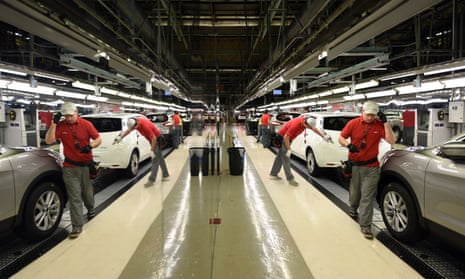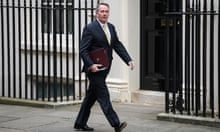The trade association for UK carmakers has backed a warning from the boss of Nissan that Brexit threatens Britain’s vehicle manufacturing industry.
Carlos Ghosn, Nissan’s chief executive, said he could scrap a potential new investment in the UK’s biggest car plant in Sunderland if the government refuses to pledge compensation for any tariffs that may be imposed after Brexit.
Ghosn said: “If I need to make an investment in the next few months and I can’t wait until the end of Brexit, then I have to make a deal with the UK government. If there are tax barriers being established on cars, you have to have a commitment for carmakers who export to Europe that there is some kind of compensation.”
Ghosn’s remarks reflect growing concern among global carmakers that Britain could be heading towards a so-called hard Brexit, which would leave them paying tariffs to export UK-assembled cars to EU markets.
The Society of Motor Manufacturers and Traders echoed his warning and said Theresa May’s government should step in to preserve the mainly foreign-owned industry. SMMT estimates about 814,000 people rely on the sector for employment.
Mike Hawes, SMMT’s chief executive, said: “The government must do all it can to maintain the competitiveness of the UK automotive sector, which has been hugely successful in boosting exports, creating jobs and generating economic growth in recent years.”
Nissan, which builds about a third of Britain’s total car output at its plant in Sunderland, is due to decide early next year on where to build its next Qashqai sport utility vehicle.
Another Japanese carmaker, Toyota, has also expressed concerns about Brexit, saying the imposition of duties would make running its English plant “very, very tough”.
The result of June’s EU referendum took many investors and chief executives by surprise, triggering political and financial turmoil and the biggest ever one-day fall in sterling against the dollar.
May’s government has tried to reassure manufacturers that Britain is open for business and that it will take their views into account during negotiations on new trade relations with the EU.
Ghosn said: “The UK government … is talking with all the investors in the UK and saying: ‘OK, where are you concerned? What kind of problems do you have? What would make you stay?’ And we’ve been very clear.
“They will take this into consideration, build a policy, and as a function of this policy we will make a decision.”
Britain is expected to trigger formal divorce talks from the EU early next year, and the negotiations are expected to last two years. It is unclear whether Britian will have full access to EU markets when it leaves.
The British government says it will get the right deal but some businesses, especially those that export most of their finished products to the continent, are worried they may have to pay tariffs to sell goods into EU markets once Britain leaves.
Toyota’s executive vice-president said on Thursday it would be tough for its UK plant if Britain failed to achieve an unfettered free-trade deal with European nations.
“The challenge for all of us in the UK is to stay competitive because 85% of our production from the UK plant is exported to continental Europe,” Didier Leroy said.
“If 85% has to pay trade duties it will be very, very tough but we want to stay committed to the UK business and our factory in the UK,” he said.
Škoda’s chief executive, Bernhard Maier, said it was important for Britain to bring clarity as quickly as possible. “For us it would be very helpful if it were not to become a nail-biter but rather if there were to be concrete decisions that one can really adjust to,” he said.










Comments (…)
Sign in or create your Guardian account to join the discussion